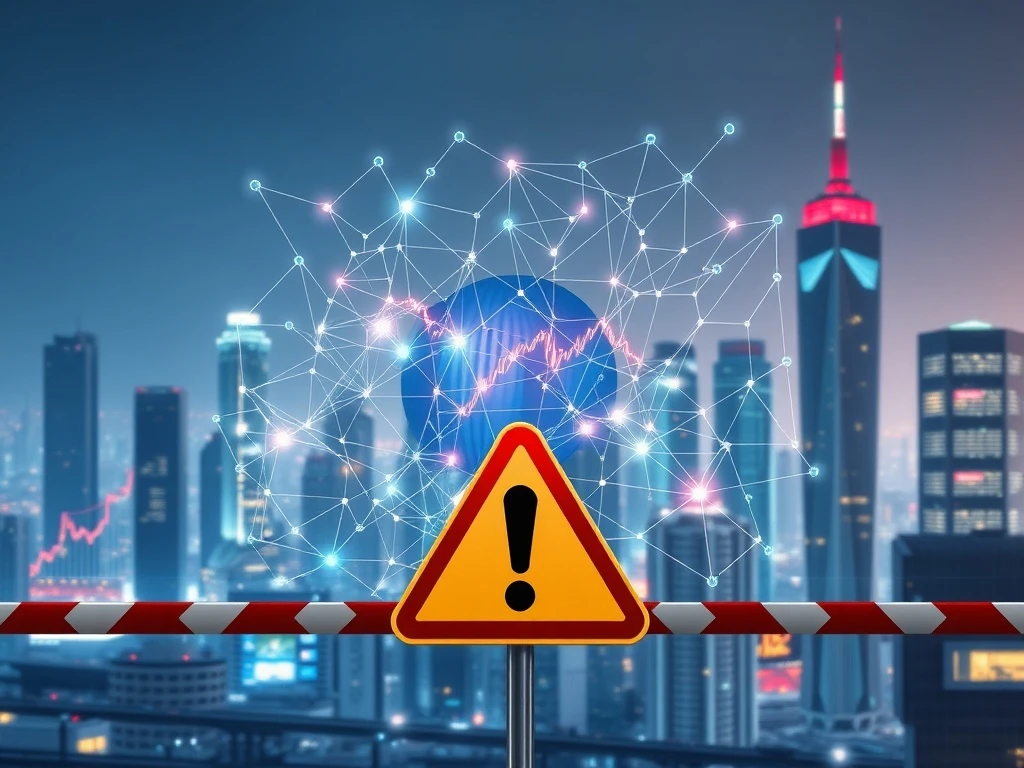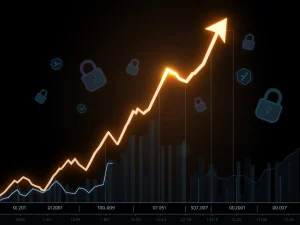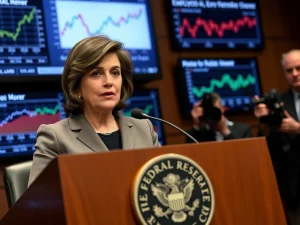Tokenization: Citadel’s Urgent Warning to SEC for Genuine Innovation

The financial world is buzzing with talk of Tokenization, the revolutionary process of transforming real-world assets into digital tokens on a blockchain. But amidst the excitement, a powerful voice, Citadel Securities, has issued a stark warning to the US Securities and Exchange Commission (SEC). Their message is clear: true progress in Tokenization hinges on genuine innovation, not clever regulatory loopholes. This isn’t just about embracing new technology; it’s about safeguarding market integrity and ensuring that the future of finance truly benefits everyone.
What is Tokenization, and Why is it Drawing Such Attention?
At its core, Tokenization is the process of converting rights to an asset into a digital token on a blockchain. Think of it like creating a digital deed or share for anything from real estate to fine art, or even traditional stocks and bonds. This digital representation brings a host of potential benefits that are attracting significant interest from both traditional finance giants and crypto-native platforms alike:
Reduced Costs: By automating many processes and minimizing the need for intermediaries, tokenization can significantly lower transaction and operational expenses.
Increased Efficiency: Settlement times can be drastically shortened, moving from days to mere minutes or even seconds, boosting liquidity and reducing counterparty risk.
Fractional Ownership: High-value assets that were once out of reach for average investors, such as multi-million dollar properties or rare artworks, can be divided into smaller, more affordable tokens, democratizing access to investment opportunities.
Enhanced Liquidity: Assets that were traditionally illiquid, difficult to buy or sell quickly, can become more easily transferable and tradable on global digital markets.
The World Economic Forum’s December report highlighted that the benefits of tokenization in capital markets would “increase exponentially as more institutions and infrastructures see the advantages for themselves.” This sentiment is echoed by major players like BlackRock and Franklin Templeton, who have actively entered the tokenization race. Alongside them are crypto-focused platforms such as Coinbase, Robinhood, and Kraken, all vying for a share of this burgeoning market. Currently, tokenized Real World Assets (RWA) are valued at roughly $25 billion, a clear indicator of the growing interest.
Even SEC Chair Paul Atkins has advocated for Tokenization, drawing parallels to the evolution of audio formats and suggesting an “innovation exemption” to foster its development. This growing support from regulators underscores the perceived potential, yet also highlights the need for careful navigation of this new landscape.
Citadel’s Crucial Stance on SEC Regulation
While the promise of Tokenization is vast, market maker Citadel Securities has introduced a critical note of caution to the ongoing discussions within the US Securities and Exchange Commission (SEC). Their statement to the SEC’s Crypto Task Force underscores a fundamental principle: the success of tokenized securities must stem from delivering “real innovation and efficiency to market participants, rather than through self-serving regulatory arbitrage.” This distinction is paramount, as it challenges the notion that tokenization should merely offer a way to circumvent existing rules rather than genuinely improve financial markets.
Citadel’s concerns are not trivial. They caution that the rapid expansion of asset Tokenization, if not properly managed, could “siphon liquidity” from established, well-regulated traditional stock markets. This fragmentation of liquidity could lead to less efficient price discovery and increased volatility. Furthermore, they warn about the potential creation of “new liquidity pools that are inaccessible” to key institutional investors, such as pension funds, banks, and endowments. If these major players, who represent vast sums of capital and millions of beneficiaries, cannot seamlessly access or participate in tokenized markets due to regulatory or infrastructural barriers, it could undermine the very goal of increased efficiency and market access that tokenization promises.
This perspective is particularly relevant given the SEC’s recent shift in tone, moving away from a stance of “regulation through enforcement” towards a more collaborative approach that acknowledges “innovation.” Citadel’s intervention ensures that this newfound openness doesn’t lead to a lax environment where the fundamental principles of market integrity and investor protection are compromised. Effective SEC Regulation is vital to ensure that the benefits of tokenization are widely distributed and do not create new systemic risks.
Navigating the Digital Asset Landscape: Challenges for Traditional Finance
Citadel isn’t alone in highlighting the complexities and challenges that traditional financial institutions face as they increasingly engage with the Digital Asset space. The move by JPMorgan, reportedly exploring Bitcoin-backed loans, exemplifies the growing pressure on established players to adapt. This shift from a historically cautious stance on crypto by a major bank signals a broader trend, yet it also illuminates the significant hurdles that remain for non-native players.
Adam Reeds, co-founder and CEO of Ledn, a prominent crypto lending platform, articulates these challenges clearly. He points out that even under more crypto-friendly regulations, traditional banks will contend with three primary obstacles:
Secure Custody: The secure storage of highly volatile and technically complex digital assets requires specialized infrastructure and expertise that differs significantly from traditional asset custody.
Collateral Volatility: Managing the rapid and often unpredictable price swings of cryptocurrencies like Bitcoin, especially when used as loan collateral, demands sophisticated risk management frameworks.
Orderly Liquidation Frameworks: Establishing clear, efficient, and transparent processes for liquidating crypto collateral during market downturns or default scenarios is crucial for maintaining market stability and investor confidence. As Reeds emphasizes, “Bitcoin-backed lending isn’t just about holding assets; it’s about what happens when markets move fast and ensuring clients know exactly how their Bitcoin is being managed at all times.”
Beyond these, the issue of safe self-custody and the permanent loss of assets due to mishandling or technical errors remains a significant concern. Harry Donnelly, CEO of Circuit, developed a crypto recovery engine specifically to address this barrier to mainstream adoption. “The permanent loss of assets is one of the biggest barriers to mainstream adoption,” Donnelly noted, underscoring the need for robust solutions that build trust and mitigate risk for institutions venturing into Digital Assets.
The Promise of Real World Assets (RWA) Tokenization: A Double-Edged Sword?
The concept of tokenizing Real World Assets (RWA) is arguably one of the most compelling applications of blockchain technology. It promises to unlock immense value by bringing illiquid assets onto the blockchain, making them more accessible, transparent, and tradable. Imagine fractional ownership of commercial real estate, fine art, private equity, or even commodities, all represented by digital tokens. This paradigm shift could democratize investment opportunities, enhance global liquidity, and create entirely new financial products.
However, Citadel’s warning casts a necessary shadow of caution over this promising frontier. While the potential for efficiency and access is clear, the risk lies in how these new tokenized markets integrate with existing financial infrastructure and regulatory frameworks. If RWA tokenization leads to a fragmented landscape where specific assets are tokenized on isolated platforms, or where regulatory oversight is inconsistent across different jurisdictions, the benefits could be overshadowed by new risks. These risks include:
Market Fragmentation: As Citadel warned, if liquidity is siphoned into disparate, new pools that are not easily accessible or interoperable, it could lead to less efficient markets and hinder broad institutional participation.
Legal and Ownership Clarity: Ensuring that the digital token accurately represents the legal ownership and rights to the underlying physical asset is paramount. This requires robust legal frameworks that bridge the gap between traditional property law and blockchain technology.
Valuation Challenges: For illiquid RWAs, establishing reliable and transparent valuation mechanisms on-chain can be complex, potentially leading to price discrepancies and market manipulation if not properly addressed.
Interoperability: For RWA tokenization to truly flourish, different blockchain networks and traditional financial systems must be able to seamlessly communicate and transact. Without robust interoperability standards, isolated silos could emerge, limiting the full potential of these assets.
Therefore, while the allure of Real World Assets tokenization is undeniable, a measured and collaborative approach is essential to ensure its development is truly innovative and beneficial for the entire financial ecosystem.
Fostering Blockchain Innovation Responsibly: A Path Forward
The discourse around Tokenization, particularly Citadel’s recent warning, underscores a critical juncture for the financial industry. It’s clear that the future isn’t about traditional finance versus crypto, but rather about a collaborative integration that leverages the strengths of both. To foster genuine Blockchain Innovation responsibly, a multi-faceted approach involving regulators, established financial institutions, and crypto-native innovators is essential.
The SEC’s role is paramount in this evolution. While an “innovation exemption” could stimulate growth, it must be meticulously defined to prevent its misuse as a loophole for regulatory arbitrage. Clear, consistent, and forward-looking regulatory guidelines are needed that:
Prioritize Investor Protection: Ensuring that new tokenized products and markets uphold the highest standards of transparency, disclosure, and consumer safeguards.
Maintain Market Integrity: Guarding against fragmentation, manipulation, and systemic risks that could arise from new, less-regulated liquidity pools.
Promote Interoperability: Encouraging the development of standards and protocols that allow tokenized assets to move seamlessly across different blockchain networks and traditional financial systems, fostering a truly interconnected global market.
Encourage Responsible Innovation: Creating a regulatory sandbox or framework that allows for experimentation and growth while providing sufficient oversight to mitigate potential harms.
Furthermore, traditional financial institutions must continue to invest in understanding and building the necessary infrastructure for digital assets, addressing challenges such as secure custody, collateral management, and robust liquidation frameworks. Similarly, crypto-native firms must engage proactively with regulators, sharing their expertise and demonstrating a commitment to compliance and responsible market development.
Ultimately, the goal is to harness the transformative power of Blockchain Innovation to create more efficient, accessible, and resilient financial markets, without inadvertently creating new vulnerabilities or disadvantaging existing market structures. This requires a delicate balance of encouragement and oversight, ensuring that progress is both rapid and secure.
Tokenization stands at a pivotal moment. Citadel’s warning serves as a vital reminder: the path to a truly innovative and efficient financial future lies not in skirting rules but in building robust, transparent systems that benefit all participants. The SEC, industry leaders, and innovators must collaborate to ensure that the promise of tokenization is fully realized, ushering in an era of unprecedented financial accessibility and efficiency, rather than merely creating new avenues for arbitrage. The stakes are high, but the potential rewards for responsible innovation are immense, promising to reshape global finance for decades to come.









